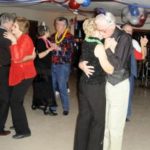
Does the dance go on forever?
by Karen Kreps
Despite the aging of the population, not much is known about the sexual behaviors and sexual function of older folks, according to a report in the New England Journal of Medicine. Aging sexual behavior is not reflected in the media, except as the butt of comedy.
We see sexual expression mostly in young to middle-aged adults. Senior sexuality is rarely discussed, giving the false idea that perhaps it might be nonexistent. Yet in one study, thirty-eight percent of men and twenty-two percent of women reported having talked about sex with a doctor since the age of fifty.
We’re living longer. What’s to become of us? Are we all just going to lose our sex drive and complete our lives as celibates?
Not necessarily. Several recent reports indicate that age typically doesn’t significantly diminish the need and desire for sex. Male and female orgasm can continue almost indefinitely. Although orgasm is desired, it is not always achieved. Regular sexual activity, including oral sex and masturbation, is standard when a partner is available, masturbation alone when one isn’t. And most elderly credit sex for physical and psychological health.
Sure, as we get older, our senses become less keen; we don’t have as much stamina for strenuous activity and exertion. Naturally, our sexual sensations and the ability to perform sexually will modestly decline—but barring serious medical problems they don’t go away.
“Sexual activity may be enjoyed for as long as you live,” says my father, Sidney Kreps, MD, who practiced internal medicine for more than half his ninety-five years. “There’s nothing inherent in aging that causes a lack of desire or ability to perform sexually,” he says. “Some people will use age as an excuse if they have personal reasons to get out of having sex. When people are discouraged by their relationships, they may lose their libidos.
“Exercise can help one maintain good physical condition and it has a corresponding psychological effect.” He speaks of exercise in general; I think of how the lifelong practice of Kegel exercises can keep the muscles surrounding our sexual equipment strong.
One recent national sampling of thousands of fifty-seven to eighty-five year olds charted the prevalent decline of sexual activity with age. Women were significantly less likely than men at all ages to report sexual activity. The lack of available partners is a big issue, especially for women, who outlive men on average by eight years.
Among respondents who were sexually active, about half reported at least one bothersome exual problem. Women reported low desire, difficulty with vaginal lubrication and inability to climax.
Among men, the most prevalent sexual problems were erectile difficulties. Fourteen percent of men reported using medication or supplements to improve sexual function. Men and women who rated their health as being poor were less likely to be sexually active and, among respondents who were sexually active, were more likely to report sexual problems.
For even healthy men, a drop in testosterone levels may contribute to slower arousal time, softer erections and longer recovery periods. This is a normal facet of aging and not impotence. All they need is more manual stimulation. Some older men won’t have an orgasm or ejaculate, or they’ll take longer to do so, yet they can achieve a great deal of pleasure from sexual intimacy.
For women, lower levels of estrogen may lead to loss of elasticity and a thinning of the vaginal tissue, less lubrication and a shrinking in size of the clitoral, vulva and labial tissues. A water-based lubricant or estrogen crème becomes an integral part of foreplay. Luckily, the sensitivity of the clitoris remains the same.
As we move on, we gain a greater sense of self-awareness, self-love and confidence, all of which contributes to fine lovemaking.
I personally know not one, but two women who experienced strong sexual awakenings post menopause. Perhaps these are exceptions, but they are inspiring. Both had been bored by marital sex and thought their sexual appetites would not be renewed. One, in her fifties, flirted with an affair that didn’t work out, but it taught her that she is just as responsive as when she was twenty. The other, now, after a dozen years living alone, is a widowed septuagenarian with eleven grandchildren, and she is having a fine romance with an old beaux. She says she never was multi-orgasmic during her marriage, but she is now. Stories abound in assisted living and nursing home facilities of elderly widows and widowers whose long-dormant sexuality is reawakened by attraction to a new, albeit equally old, partner.
Hugging, kissing and touching and other expressions of intimate, adult affection are essential parts of an elder’s sex life.
Many of today’s elderly have trouble speaking openly about their intimate needs and desires. They were raised to think it taboo. Future generations of elderly are likely to forge new solutions to the sexual and social problems of later years because of their more open attitudes born in the sexual revolution that occurred when the baby boomers shot past puberty.


